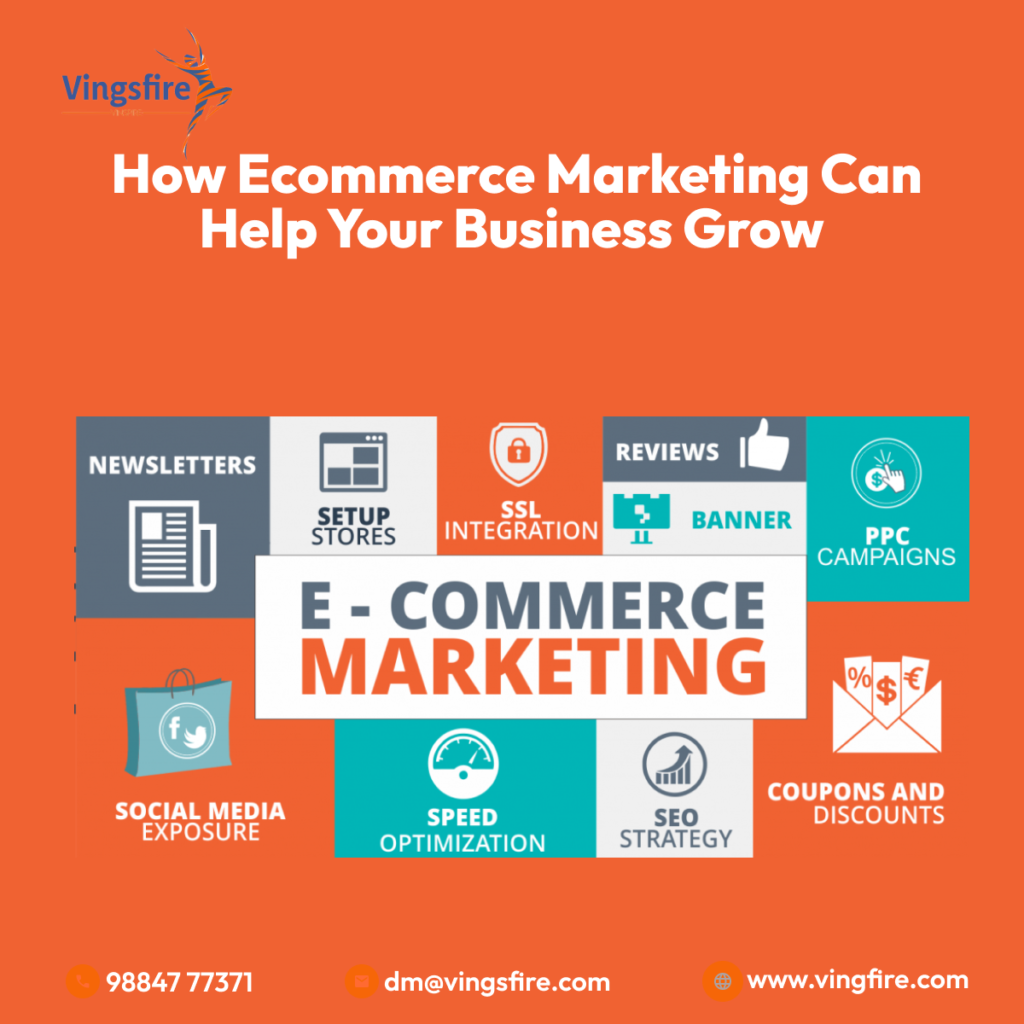
Introduction:
E-commerce marketing has become essential for businesses looking to thrive in the digital age. With the rapid growth of online shopping, businesses must leverage effective E-commerce marketing strategies to attract customers, drive sales, and grow their online presence. In this comprehensive guide, we’ll explore the various ways E-commerce marketing can help your business grow and provide actionable insights to maximize your success in the E-commerce space.
Benefits Of E-Commerce:
Ecommerce marketing offers several benefits for businesses looking to grow their online presence and increase sales:
Expanded Reach:
Ecommerce marketing allows businesses to reach a global audience of potential customers, breaking down geographical barriers and expanding their market reach beyond their local area.
Increased Visibility: By optimizing their ecommerce website for search engines and promoting their products through digital channels, businesses can increase their visibility and attract more traffic to their online store.
Targeted Advertising:
Ecommerce marketing enables businesses to target specific demographics, interests, and behaviors with precision, ensuring that their marketing efforts reach the most relevant audience.
Improved Conversion Rates:
With targeted advertising, personalized messaging, and optimized user experiences, ecommerce marketing can help businesses increase their conversion rates and turn visitors into customers.
Measurable Results:
Ecommerce marketing provides businesses with valuable data and insights that allow them to measure the effectiveness of their campaigns, track key performance indicators (KPIs), and optimize their strategies for maximum impact.
Key Strategies and Tactics:
There are several key strategies and tactics businesses can employ to leverage the power of ecommerce marketing:
Search Engine Optimization (SEO): SEO is essential for improving the visibility and ranking of your ecommerce website in search engine results pages (SERPs). By optimizing your website’s structure, content, and metadata, you can increase organic traffic and attract more visitors to your online store.
Pay-Per-Click (PPC) Advertising: PPC advertising allows businesses to place ads on search engines and other digital platforms and pay a fee each time a user clicks on their ad. By targeting specific keywords and demographics, businesses can drive targeted traffic to their website and generate leads and sales.
Email Marketing: Email marketing is a highly effective way to nurture leads, build relationships with customers, and drive repeat purchases. By sending targeted and personalized email campaigns, businesses can keep their audience engaged, promote new products or offers, and encourage customer loyalty.
Social Media Marketing: Social media marketing involves using social media platforms such as Facebook, Instagram, Twitter, and LinkedIn to connect with your audience, build brand awareness, and drive engagement.
By sharing valuable content, participating in conversations, and running targeted advertising campaigns, businesses can reach their target audience where they spend their time online.
Trends and Innovations in Ecommerce Marketing:
Ecommerce marketing is constantly evolving, with new trends and innovations emerging regularly. Some of the key trends shaping the future of ecommerce marketing include:
Personalisation: Personalisation is becoming increasingly important in ecommerce marketing, as customers expect tailored experiences and recommendations based on their preferences and behavior.
Omnichannel Marketing: Omnichannel marketing involves providing a seamless and integrated shopping experience across multiple channels and devices, allowing customers to move seamlessly between online and offline touchpoints.
Mobile Commerce (M-commerce): With the proliferation of smartphones and mobile devices, mobile commerce is on the rise, and businesses must optimize their ecommerce websites for mobile users to capitalize on this trend.
Visual Search: Visual search allows users to search for products using images rather than text, enabling businesses to enhance the discoverability of their products and improve the shopping experience for their customers.
Conclusion:
Ecommerce marketing offers businesses a powerful way to grow their online presence, attract customers, and drive sales. By understanding the key strategies, tactics, and trends in ecommerce marketing, businesses can create effective and impactful marketing campaigns that deliver results.
Whether it’s optimizing their website for search engines, running targeted advertising campaigns, or leveraging emerging technologies like personalisation and visual search, businesses can harness the power of ecommerce marketing to achieve their business goals and thrive in the competitive ecommerce landscape.
